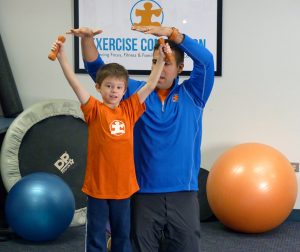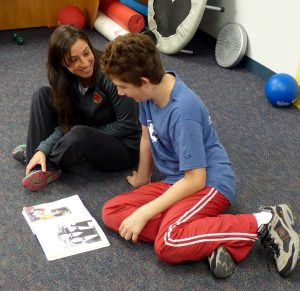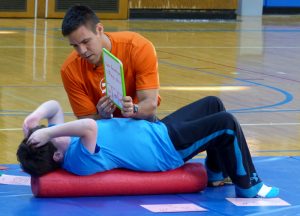 Over the last 12 years I have given hundreds of presentations to the autism community. From my first presentation till now, my message has been the same: Exercise needs to be a part of the daily routine for individuals with autism. However, merely saying that does not always connect with each person in the audience.
Over the last 12 years I have given hundreds of presentations to the autism community. From my first presentation till now, my message has been the same: Exercise needs to be a part of the daily routine for individuals with autism. However, merely saying that does not always connect with each person in the audience.
Much like working with our children, I have had to customize my message, my delivery and my PowerPoint slides to the audience. I thought sharing success stories I have had with my children and classrooms would be enough to get people motivated to try exercise. But I have learned that just wasn’t the case.
Research-Supported Benefits
School administrators and therapists want the research, so I share it.
In addition to the health-related benefits of physical activity decreased stereotypy and self-stimulating behavior are the most common behavioral improvements following physical activity for children with autism. More pronounced effects were evident following vigorous bouts of physical activity, according to an article published in BMC Research Notes (MacDonald, Esposito & Ulrich, 2011). In addition, vigorous physical activities, in conjunction with appropriate behavior management practices (Lavay, French &Henderson, 1997), can be helpful in reducing inappropriate behaviors in children with autism.
Parents and Para-educators want to know the exercises they can immediately do with their children or students. In every presentation we perform exercises along with the strategies on how to break them down into simple steps so their children and students can be successful.
 Even after sharing the stories, research, and exercises, one question kept coming up in all the groups, “how do I get my child to start exercising?”
Even after sharing the stories, research, and exercises, one question kept coming up in all the groups, “how do I get my child to start exercising?”
I have thought to myself, “I just gave them every tool in my toolbox, what am I not saying or doing?” Then I look back at my experiences of working in these parents’ homes, as a para-educator and as a fitness coordinator for a school for children with autism.
Parents and professionals are often overwhelmed and adding another task to the list can be too much. They want the “magic-pill” that will get their children exercising. That pill doesn’t exist but there is one strategy that can be just as effective.
Persistence Vs. Perfection
Last year I was giving a workshop and I had changed my PowerPoint slides because I was presenting to a new audience — caseworkers. Following the conference I was reading their evaluations and there was one slide that stuck with a majority of the participants – Persistence not Perfection.
Perfection is what many strive for in their children, which of course is not realistic and certainly not where you should set your expectations when it comes to exercise. You just need to get your children moving their bodies. Don’t worry if the exercise doesn’t look like how you saw on TV or how you demonstrated it. If you get your children or students to start moving more than they have before you have done a great job.
Y ou often hear that you need to exercise for sixty minutes a day, five days a week. While that would be fantastic, most people can’t commit to that amount of time and if they do (the new years resolution) they are overwhelmed and have given up within the first month. This is an unrealistic expectation to put on our children and ourselves.
ou often hear that you need to exercise for sixty minutes a day, five days a week. While that would be fantastic, most people can’t commit to that amount of time and if they do (the new years resolution) they are overwhelmed and have given up within the first month. This is an unrealistic expectation to put on our children and ourselves.
To begin, you may only do five minutes or one exercise a day but be persistent with it. If you can do that for your child or students, that is success. Then, gradually, build on that success. This is the same approach I have taken with all my Champions and classrooms.
If you haven’t tried exercise yet, I promise, it’s worth the effort.
Reprinted with permission from David Geslak.
Coach Dave, founder of Exercise Connection and ExerciseBuddy, is widely recognized for the pioneering of visual exercise programs for those with autism, as well as, his insightful and dynamic presentations. Nine universities have now adopted ExerciseBuddy, an App that inspires those with autism to exercise. As an author, former para-educator and Fitness Coordinator at a school for those with autism, the autism community has embraced Dave’s message and are especially encouraged by his results.

